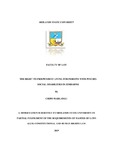Please use this identifier to cite or link to this item:
https://cris.library.msu.ac.zw//handle/11408/3925| Title: | The right to independent living for persons with pyscho - social disabilities in Zimbabwe | Authors: | Mahlangu, Chipo | Keywords: | right to independent living psycho - social disabilities |
Issue Date: | 2019 | Publisher: | Midlands State University | Abstract: | The United Nations Convention on the Rights of Persons with Disabilities (CRPD) to which Zimbabwe is a State Party guarantees the right to independent living for all persons with disabilities (PWDs). The CRPD reaffirms the fundamental right of persons with disabilities for inclusion, independence and equality. Zimbabwe has a history of providing for the support, housing and mental health care services and needs of people with psychosocial disabilities in large institutions and hospitals. The problem is that Zimbabwe’s legal framework does not provide for a standalone right to independent living contrary to Article 19 of the CRPD. In the Zimbabwean Constitution, the right to independent living is absent contrary to provisions in the CRPD. On the other hand, the Disabled Persons Act is yet to be aligned to the Constitution and the CRPD, it predates the CRPD and embodies the Medical Model of disability. The Mental Health Act and the Social Welfare Assistance Act also do not contain a human rights-based approach in dealing with PWDs. The Disabled Persons Act does not have a provision for the right to independent living for PWDs and views PWDs from a medical and welfare perspective. The Mental Health Act governs the involuntary detention of PWPDs and fails to provide for mental health care services outside hospitals and institutions in violation of Article 19 of the CRPD. On a comparative basis, despite the fact that the Tanzanian Constitution was enacted prior to the CRPD, Tanzania enacted a comprehensive disability law in terms of its Persons with Disabilities Act and the Mental Health Act. The right to independent living is expressly provided and promoted in the mentioned statutes in line with the CRPD. Given the gaps in the Zimbabwean legal framework, it is specifically recommended that the Constitution be amended to incorporate the right to independent living as a standalone right. Furthermore, the Mental Health Act and the Social Welfare Assistance Act should be amended while the Disabled Persons Act should be repealed and be replaced with a new Statute. Generally, it is recommended that the CRPD be domesticated into the Zimbabwean law. In addition, there is a need for awareness-raising regarding the right to independent living for PWPDs. A National Disability Policy and general Regulations will also help in the implementation and realisation of this right. Once the implementation of the recommendations is put in place, PWPDs in Zimbabwe will be able to enjoy their right to independent living on an equal basis with others. | URI: | http://hdl.handle.net/11408/3925 |
| Appears in Collections: | Master of Laws: Constitutional and Human Rights Law |
Files in This Item:
| File | Description | Size | Format | |
|---|---|---|---|---|
| mahlangu.pdf | Full Text | 632.06 kB | Adobe PDF |  View/Open |
Page view(s)
136
checked on Apr 28, 2025
Download(s)
170
checked on Apr 28, 2025
Google ScholarTM
Check
Items in MSUIR are protected by copyright, with all rights reserved, unless otherwise indicated.



